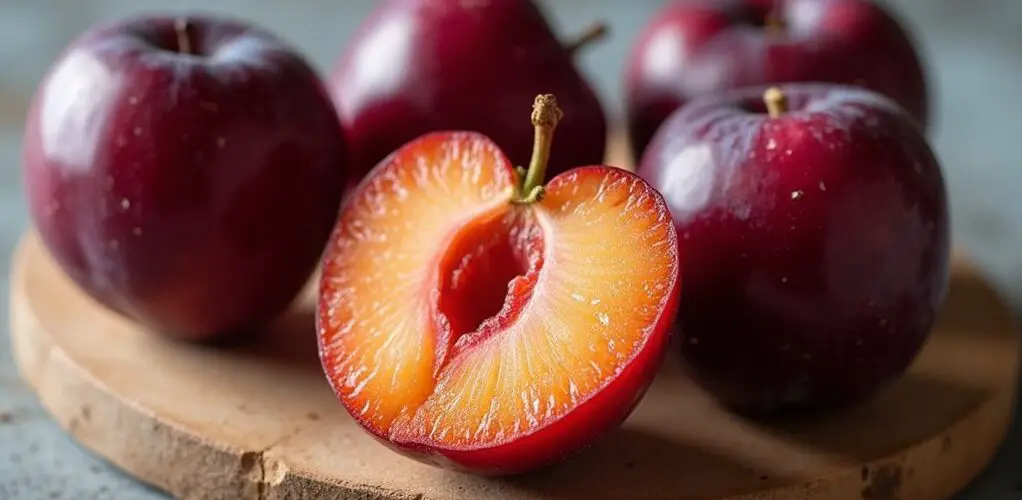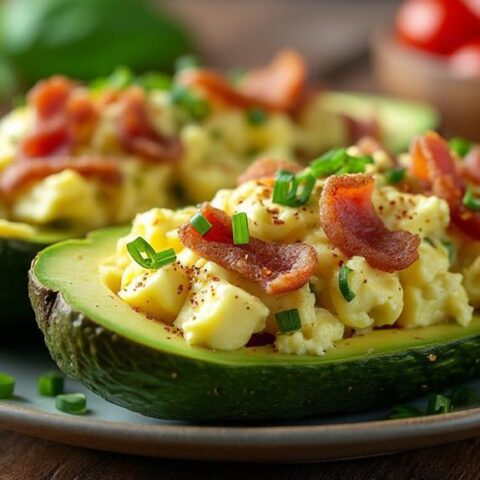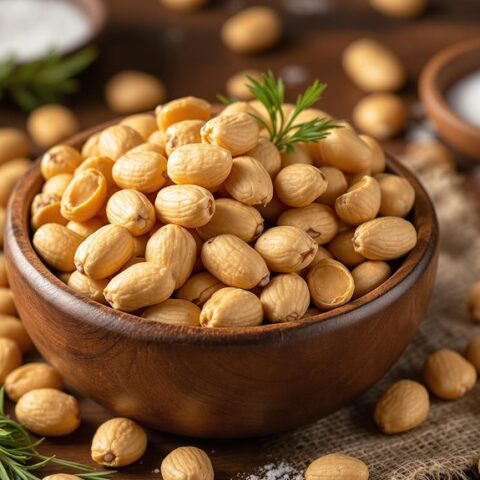
Plums contain moderate carbohydrates at 7.5 grams per 100 grams, with most coming from natural sugars. Their low glycemic index below 55 and glycemic load of 2 indicate minimal blood sugar impact, making them suitable for many low-carb diets when portioned appropriately. A medium plum provides 30 calories, 1.1 grams of fiber, and essential nutrients like vitamins A and C. Those following strict ketogenic diets should limit intake to 2-3 plums daily, while deeper nutritional benefits await exploration.
Key Takeaways
- Plums contain 7.5 grams of carbohydrates per 100 grams, making them relatively low-carb compared to many other fruits.
- Each medium plum has only 30 calories and provides 1.1 grams of fiber, reducing its net carb impact.
- The glycemic index below 55 and glycemic load of 2 indicate plums have minimal impact on blood sugar.
- Those following ketogenic diets should limit intake to 2-3 medium plums daily to maintain ketosis.
- One medium plum contains 6.6 grams of natural sugars, requiring portion control for carb-restricted diets.
Understanding Plum Carbohydrate Content
When considering plums for a low-carb diet, understanding their carbohydrate composition is essential for making informed dietary choices. A plum contains approximately 7.5 grams of carbs per 100 grams, with the majority coming from natural sugars at 6.6 grams, while fiber contributes about 1.1 grams per medium fruit.
What makes plums particularly interesting for those monitoring their carbohydrate intake is their low glycemic load of 2, indicating minimal impact on blood sugar levels. This characteristic, combined with their modest carbohydrate content, makes them a viable option for many low-carb eating plans.
However, those following strict ketogenic diets should monitor their portion sizes carefully to maintain their daily carbohydrate target of 20-30 grams, as even moderate plum consumption can contribute considerably to this limit.
Net Carbs Vs Total Carbs in Plums
The distinction between net carbs and total carbs in plums creates a significant difference for those following low-carb eating plans. While plums contain approximately 7.5g of total carbs per 100g serving, their net carb content is significantly lower when accounting for fiber content.
To calculate net carbs in plums, subtract the fiber content (1.1g per medium plum) from the total carbohydrates. This calculation reveals that plums are relatively low carb compared to many other fruits, making them a viable option for those monitoring their carbohydrate intake.
However, individuals following strict ketogenic diets should carefully portion their plum consumption, as multiple servings could quickly accumulate toward their daily carb limit of 20-30g. The fruit's low glycemic load of 2 further supports its inclusion in various low-carb dietary approaches.
Blood Sugar Impact of Plums
Understanding plums' impact on blood sugar levels builds directly on their net carb content, offering valuable insights for those managing their glucose levels. With a glycemic index below 55 and a glycemic load of just 2, plums are generally considered blood sugar-friendly for most individuals.
- The fiber content in plums helps moderate glucose absorption, making them a smart choice for steady energy release.
- At 7.5g of carbohydrates per medium plum, their impact on blood sugar remains relatively modest.
- Using continuous glucose monitors can help track individual responses to plum consumption.
While plums typically maintain stable blood sugar levels due to their fiber content and low glycemic load, individual responses may vary. Regular glucose monitoring is essential during the initial phase of a dietary change to maintain safe levels and adjust as needed. Testing blood sugar before and after eating plums can help determine personal tolerance and ideal portion sizes.
Plums in Different Dietary Plans
Since plums contain moderate carbohydrate levels, incorporating them into various dietary plans requires careful consideration and portion control. For those following ketogenic diets, with daily carb limits of 20-30g, plums should be consumed sparingly and balanced with other low-carb fruits and foods to maintain ketosis. The fruit's low glycemic load of 2 makes it a viable option for blood sugar management when incorporated thoughtfully into diabetic meal plans. With 7.5g of carbohydrates per 100g and 1.1g of fiber in a medium plum, they can fit into moderate-carb diets while supporting digestive health. However, individuals following strict low-carb protocols may prefer alternatives like strawberries or mushrooms to better align with their dietary goals. It's important to monitor cholesterol levels through regular lipid panel tests, especially for those on ketogenic diets where individual responses can vary significantly.
Essential Nutrients Found in Plums
Plums offer a rich array of essential nutrients, including vitamins A and C for immune support, along with potassium for cardiovascular health.
The fruit's impressive antioxidant profile, particularly its phenolic compounds, provides protection against cellular damage while supporting overall wellness.
Beyond vitamins and minerals, plums contain both soluble and insoluble fiber, with natural sugars accounting for most of their 7.5 grams of carbohydrates per 100 grams, making them a nutritious choice for those monitoring their carbohydrate intake.
Vitamins and Mineral Content
A treasure trove of essential nutrients makes plums a valuable addition to any diet, even for those following low-carb eating plans.
These stone fruits pack an impressive array of vitamins and minerals, with vitamin C leading the way at 20% of the daily recommended intake per serving. The nutritional profile includes significant amounts of potassium, which helps maintain healthy blood pressure levels.
- Vitamin C content supports immune function and promotes collagen production for skin health
- Vitamin A contributes 10% of daily needs, supporting vision and skin maintenance
- Potassium delivers approximately 100mg per medium fruit, aiding cardiovascular health
The fruit's nutrient density extends to include beneficial amounts of iron and B vitamins, making plums a smart choice for those seeking extensive nutritional support in their diet.
Antioxidant Power of Plums
While many fruits offer nutritional benefits, the remarkable antioxidant profile of plums sets them apart in the world of healthy foods. Their rich antioxidants, particularly phenolic compounds like proanthocyanidins and kaempferol, work tirelessly to combat oxidative stress in the body, protecting cells from damage and supporting long-term health.
| Antioxidant Benefits | Health Impact |
|---|---|
| Phenolic compounds | Cell protection |
| Proanthocyanidins | Brain health |
| Kaempferol | Disease prevention |
| Vitamin C | Immune support |
| Membrane integrity | Cellular health |
These antioxidant properties contribute considerably to overall wellness by safeguarding cell membranes and reducing the risk of chronic conditions. Combined with vitamin C, which acts as both an antioxidant and immune system supporter, plums provide thorough protection against free radical damage while promoting ideal health.
Fiber and Sugar Breakdown
Despite their sweet taste, medium-sized plums contain a modest 7.5 grams of total carbohydrates, positioning them as a favorable choice for those monitoring their carbohydrate intake.
Within this carbohydrate content, 6.6 grams come from natural sugars, while 1.1 grams consist of beneficial dietary fiber.
The fiber and sugar composition of plums offers several nutritional advantages:
- The fiber content aids digestive health and promotes feelings of fullness
- A low glycemic load of 2 helps maintain stable blood sugar levels
- The balance of fiber to sugar provides sustained energy release
This breakdown demonstrates why plums can be incorporated into a balanced diet, as their fiber content helps offset the sugar impact while providing essential nutrients in a relatively low-carbohydrate package.
Weight Management and Plum Consumption
Plums offer significant benefits for weight management through their low caloric content of 30 calories per fruit and their fiber-rich composition, which helps control appetite and promote feelings of fullness.
The ideal portion size for weight management typically ranges from one to two medium plums per serving, allowing individuals to satisfy sweet cravings while maintaining their dietary goals.
These fruits can support metabolic health through their low glycemic impact and natural compounds, making them an excellent addition to a balanced, weight-conscious eating plan.
Plums For Weight Loss
Health-conscious individuals seeking effective weight management solutions will find fresh plums to be a valuable addition to their dietary plans. With only 30 calories per medium fruit and 7.5g of carbohydrates per 100g, plums offer a satisfying way to manage weight while maintaining nutritional balance. Their fiber content contributes to prolonged satiety, helping control appetite throughout the day.
- Low glycemic load of 2 guarantees minimal blood sugar fluctuations, supporting steady energy levels
- Each plum delivers 1.1g of fiber, promoting digestive health and natural appetite regulation
- Natural sweetness satisfies cravings while staying within caloric goals for weight loss
The combination of low caloric density and beneficial nutrients makes plums an ideal choice for those working toward their weight management objectives while following a controlled-carbohydrate eating plan.
Portion Control Guidelines
While incorporating plums into a weight management plan offers numerous benefits, understanding proper serving sizes helps maximize their advantages while maintaining carbohydrate goals. A medium plum contains 7.5g of carbohydrates, making portion control vital for those following specific dietary protocols, particularly ketogenic or low-carb plans.
For individuals monitoring blood sugar or adhering to strict carbohydrate limits of 20-30g daily, careful measurement of plum servings becomes necessary. Healthcare professionals recommend starting with a single medium plum to assess individual tolerance and blood sugar response.
Those following ketogenic diets should be especially mindful, as consuming multiple plums can quickly accumulate carbohydrates and potentially disrupt ketosis, making thoughtful portion planning essential for successful dietary management.
Metabolism-Boosting Properties
Several metabolic benefits make plums a strategic choice for individuals pursuing weight management goals while following a low-carb lifestyle. These fruits support metabolic health through their unique combination of nutrients and natural compounds, while maintaining relatively low carbohydrates content at 7.5g per 100g serving.
- The high fiber content promotes satiety and improved digestion, helping control appetite and caloric intake.
- Their low glycemic load of 2 helps maintain stable blood sugar levels, supporting sustained energy and reducing cravings.
- Natural antioxidants, particularly phenolic compounds, combat oxidative stress and inflammation, potentially enhancing metabolic function.
Research suggests that incorporating plums into a balanced diet can contribute to weight management efforts while providing essential nutrients, making them a valuable addition to low-carb eating plans focused on metabolic optimization.
Portion Control Guidelines for Plums
Proper portion control proves essential for individuals following a low-carb diet who wish to include plums in their meal plans. With each medium plum containing approximately 7.5g of carbohydrates, careful monitoring of serving sizes helps maintain dietary goals while enjoying this nutritious fruit.
For those following a ketogenic diet with a daily carbohydrate limit of 20-30g, consumption should be limited to 2-3 medium plums per day. While plums offer beneficial fiber content at 1.1g per fruit, their overall carbohydrate content can quickly accumulate when eaten in larger quantities.
Individuals monitoring their blood sugar levels should consider testing their personal response to determine suitable portion sizes, as tolerance varies among people. This systematic approach enables the inclusion of plums while maintaining low-carb dietary objectives.
Seasonal Availability and Storage Tips
Understanding plum seasonality helps low-carb dieters plan their fruit consumption effectively throughout the year, with peak availability occurring during the summer months of July and August.
When selecting plums during their seasonal availability, shoppers should choose fruits with unblemished skin that yield slightly to gentle pressure.
Proper storage techniques can maximize the shelf life of plums and guarantee ideal freshness:
- Store ripe plums in the refrigerator in a breathable bag, unwashed, for up to one week
- Leave unripe plums at room temperature until they soften, then transfer to the refrigerator
- Consider dried plums (prunes) for year-round availability, storing them in a cool, dry place for up to 12 months
This storage guidance helps low-carb dieters maintain a steady supply of plums while adhering to their nutritional goals.
Comparing Plums to Other Stone Fruits
Among stone fruits commonly available to low-carb dieters, plums emerge as a favorable choice due to their relatively modest carbohydrate content of 7.5g per medium fruit. When comparing various stone fruits, plums consistently rank lower in carbohydrates than their counterparts, making them an excellent option for those monitoring their carb intake.
| Fruit | Serving Size | Carbohydrates (g) |
|---|---|---|
| Plums | 1 medium | 7.5 |
| Peaches | 1 medium | 14.5 |
| Apricots | 1 cup | 19.0 |
| Mangoes | 1 medium | 31.0 |
This comparative analysis shows that other stone fruits, such as peaches, apricots, and mangoes, contain considerably higher carbohydrate levels than plums, with mangoes containing more than four times the carbohydrates per serving.
Digestive Health Benefits of Plums
The fiber-rich content of plums plays an essential role in supporting digestive health, promoting regular bowel movements and fostering beneficial gut bacteria growth.
Plums serve as a natural digestive aid through their combination of sorbitol and phenolic compounds, which work together to enhance gastrointestinal function and alleviate digestive discomfort.
These fruits contribute to ideal digestive system balance by providing essential nutrients and antioxidants that help maintain healthy intestinal function while supporting feelings of satiety.
Fiber Supports Gut Health
While many fruits offer digestive benefits, plums stand out for their remarkable ability to support gut health through their fiber content. With approximately 0.9 grams of fiber per fruit, plums contribute considerably to digestive wellness while remaining relatively low carb compared to other fruits.
- Soluble fiber in plums promotes the growth of beneficial gut bacteria, enhancing overall digestive health.
- The combination of fiber and high water content supports ideal hydration and bowel regularity.
- Fiber helps regulate blood sugar by slowing carbohydrate absorption, making plums a smart choice for balanced nutrition.
The fiber content in plums plays an essential role in maintaining gastrointestinal health, potentially alleviating constipation and supporting regular digestive function through its natural properties.
Natural Digestive Aid Benefits
Natural digestive aid properties make plums an exceptional choice for maintaining gastrointestinal wellness and regularity. The fruit's fiber content, approximately 1.1 grams per medium plum, works synergistically with sorbitol to promote healthy bowel movements and improve digestive function.
These stone fruits offer multiple digestive health benefits through their complex nutritional profile. The fiber helps regulate blood sugar levels by slowing carbohydrate absorption in the digestive system, while simultaneously supporting proper stool consistency and frequency.
Additionally, plums contain beneficial antioxidants, particularly phenolic compounds, which provide protection against inflammation and oxidative stress in the digestive tract. This combination of fiber, natural compounds, and antioxidants makes plums an effective natural solution for maintaining ideal digestive health.
Managing Digestive System Balance
Maintaining ideal digestive system balance requires careful attention to dietary choices, making plums an excellent addition to a healthy eating plan. These fruits contribute considerably to digestive health through their unique combination of fiber and natural compounds, particularly sorbitol, which supports regular gastrointestinal function.
- Each plum provides 0.9g of fiber, promoting satiety and helping maintain digestive regularity.
- The fruit's natural compounds assist with blood sugar management by slowing carbohydrate absorption.
- Antioxidants in plums protect the digestive system from oxidative stress and inflammation.
The balanced approach to consuming plums involves mindful portions to maximize benefits while avoiding potential digestive discomfort.
Their fiber content, combined with natural sugar alcohols, creates a synergistic effect that supports overall gastrointestinal wellness when incorporated into a balanced diet.
Incorporating Plums Into Low-Carb Meals
Although plums contain carbohydrates, their moderate sugar content and rich nutritional profile make them an excellent addition to low-carb meal planning when portioned appropriately. With approximately 7.5g of carbohydrates per 100g, plums can be strategically incorporated into low-carb dishes without derailing dietary goals. Creative meal options include pairing plums with grilled chicken or baked brie, enhancing flavors while maintaining carb consciousness. Their fiber content of 1.1g per medium plum supports digestive health and helps create a feeling of fullness, making them a smart choice for those following a low-carb diet. When introducing plums into meal plans, it's important to monitor individual blood sugar responses and adjust portions accordingly, ensuring they complement rather than compromise low-carb dietary objectives. Incorporating healthy fats and proteins like avocados and fatty fish can further enhance the nutritional balance of low-carb meals, making them more satisfying and aligned with keto principles.
Plum Varieties and Their Carb Differences
Different plum varieties, including European, Japanese, and wild plums, exhibit subtle variations in their carbohydrate content, though these differences typically remain within a narrow range of 7-8g per 100g.
Wild plums tend to have slightly lower carbohydrate levels compared to their cultivated counterparts, making them particularly suitable for low-carb dietary plans.
Modern cultivated varieties, such as Santa Rosa and Methley plums, maintain consistent carbohydrate profiles due to selective breeding, allowing consumers to make reliable dietary calculations regardless of the specific variety chosen.
Popular Plum Types
The vast world of plums encompasses more than 140 varieties in the United States alone, each offering unique characteristics in taste, texture, and carbohydrate content.
Among the most popular varieties, European plums stand out for their higher sugar content, making them ideal for prune production, while Japanese plums are celebrated for their sweet, juicy nature.
Damson plums, known for their distinctive tartness, contain similar carbohydrates to other varieties.
- European plums: Higher sugar content, commonly used for prunes
- Japanese plums: Sweet and juicy, with moderate carbohydrate levels
- Damson plums: Tart flavor profile, particularly suited for preserves
The carbohydrate content across varieties remains relatively consistent, with a medium-sized plum containing approximately 7.5 grams, though specific levels can vary based on ripeness and variety.
Wild vs. Cultivated Plums
Since cultivated plums have undergone centuries of selective breeding, they generally contain more predictable carbohydrate levels compared to their wild counterparts.
While cultivated varieties typically contain around 7.5 grams of carbohydrates per 100 grams, wild plums often exhibit higher sugar content, which can impact their suitability for low-carb diets.
European and Japanese cultivated plums demonstrate consistent carbohydrate levels across harvests, making them reliable choices for those monitoring their sugar intake.
Wild plums, however, show greater variation in their levels depending on growing conditions and regional factors.
Despite their smaller size and sometimes tart flavor, wild plums can contain surprisingly high amounts of natural sugars.
This variation makes it essential for carb-conscious consumers to carefully consider their plum selection based on individual dietary needs.
Carb Content Comparison
Plum varieties demonstrate notable differences in their carbohydrate content, ranging from the relatively low-carb French prunes to the slightly sweeter Japanese varieties. While all plums maintain a generally low carb profile, averaging 7.5g per 100g, certain varieties offer distinct advantages for those following a low-carb diet.
- French plums typically contain the lowest carb content, making them an ideal choice for strict low-carb eating plans.
- Japanese plums, while slightly higher in natural sugars, still fit within most low-carb dietary guidelines.
- Greengage plums fall between these varieties, offering a moderate carb option.
A medium-sized plum contributes only about 5g of carbohydrates, and their fiber content helps moderate blood sugar impact.
This makes plums a practical choice for those monitoring their carb intake while seeking nutritional variety.
Research-Backed Health Benefits
While many fruits present challenges for those following low-carb diets, scientific research has revealed multiple health benefits that make plums a compelling choice for health-conscious individuals.
Studies demonstrate that plums effectively maintain stable blood sugar levels due to their low glycemic load of 2, making them suitable for diabetic individuals.
These versatile fruits deliver substantial health benefits through their rich antioxidant content, particularly phenolic compounds that combat oxidative stress and protect against chronic diseases.
At 100mg per medium fruit, plums provide potassium that supports cardiovascular health by regulating blood pressure.
Additionally, their fiber content of 1.1g per fruit aids digestive function while promoting satiety, supporting those pursuing weight management goals within a low-carb lifestyle.
Smart Shopping Guide for Plums
A successful low-carb shopping experience begins with understanding how to select and purchase plums effectively. When incorporating this moderate carb fruit into a low-carb diet, shoppers should prioritize fresh plums over dried varieties to maintain lower sugar intake.
The smart shopping guide for plums focuses on selecting fruit at ideal ripeness while considering nutritional content.
- Choose plums that yield slightly to gentle pressure, indicating peak ripeness and flavor
- Select fresh plums rather than dried prunes to keep carbohydrate content at 7.5g per 100g
- Inspect the fruit for firmness and avoid specimens with soft spots or blemishes
Understanding these selection criteria helps shoppers make informed choices while managing their carbohydrate intake.
With 6.6g of sugar per medium plum, careful portion control remains essential for maintaining a low-carb lifestyle.
Alternative Uses for Plums in Cooking
Once shoppers have selected their perfect plums, numerous creative cooking applications await in the kitchen. Fresh plums can transform everyday dishes into flavorful culinary experiences, offering versatile options for health-conscious cooks.
Fresh plums unlock culinary creativity, transforming simple dishes into vibrant, flavorful experiences for the health-conscious home chef.
They excel in both sweet and savory applications, from elegant appetizers like Baked Brie with Sliced Plums to sophisticated main courses such as Grilled Chicken with Plum Sauce.
For those seeking a low-carb alternative to traditional condiments, homemade plum chutney provides a customizable option with controlled sugar content.
Plums also enhance salads with their natural sweetness, complementing greens, nuts, and cheese perfectly.
Additionally, incorporating these stone fruits into smoothies offers a nutrient-dense way to enjoy their flavor while maintaining dietary goals, as they provide fiber and antioxidants without excessive carbohydrates.
Frequently Asked Questions
Are Plums Ok on a Low-Carb Diet?
Plum nutrition facts show moderate carb content. When eaten in moderation, plums can fit into low carb diets. Among low carb fruits, they offer a healthy snack option with 7.5g carbs per 100g.
What Are the Lowest Carb Stone Fruits?
Among stone fruit varieties, apricots and plums offer the lowest carbohydrate content, with favorable glycemic index ratings. Apricots contain 19g per cup, while plums provide 7.5g per medium fruit, offering nutritional benefits.
Will a Plum Spike My Blood Sugar?
Plums typically don't cause significant blood sugar spikes due to their low glycemic index and fiber content. Individual responses to fruit consumption vary, so monitoring personal glucose levels is recommended.
Are Plums OK for Weight Loss?
Plum nutrition supports weight loss benefits through their low calorie content of 30 calories per fruit. They make an excellent choice for low calorie snacking while providing fiber for increased satiety.
Conclusion
Plums offer a balanced option for those monitoring their carbohydrate intake, containing moderate net carbs while delivering essential nutrients and fiber. Their glycemic impact remains relatively modest when consumed in reasonable portions, making them suitable for various dietary approaches. Understanding the carbohydrate content of different plum varieties enables informed choices, whether enjoying them fresh or incorporating them into low-carb recipes. With proper portion control, plums can be part of a healthy, carb-conscious lifestyle.









No Comments